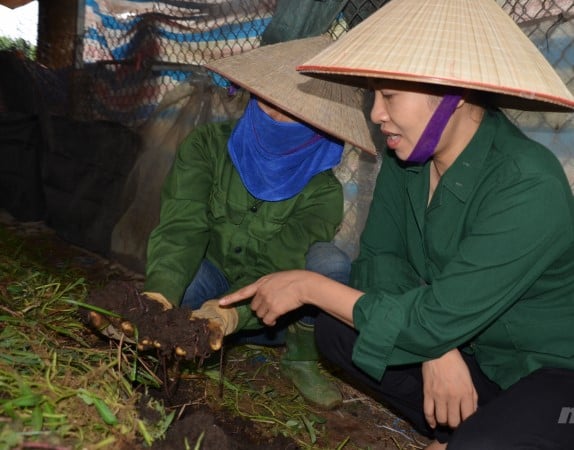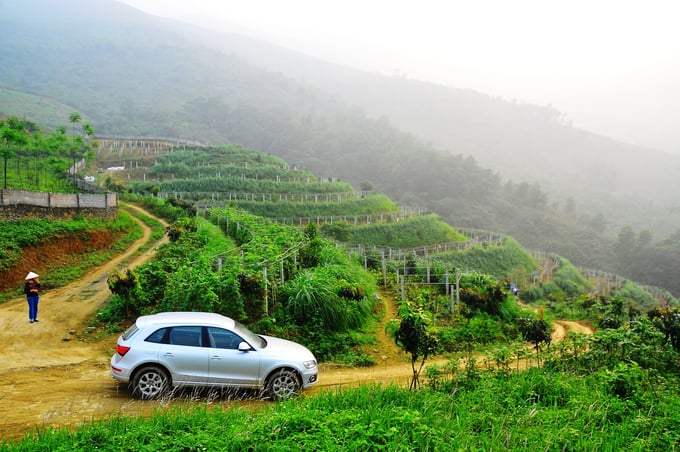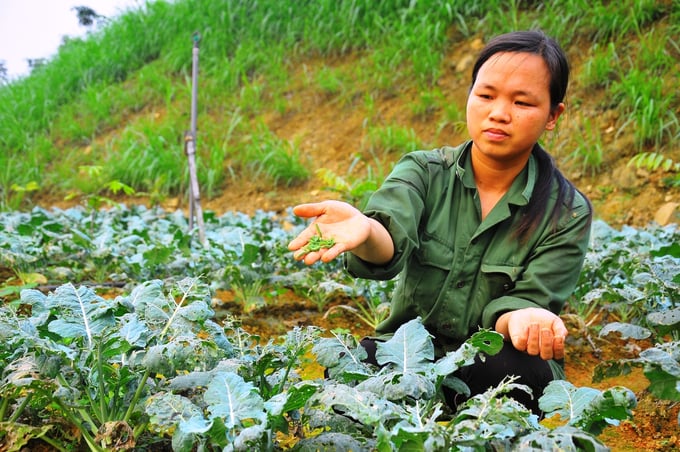May 30, 2025 | 14:18 GMT +7
May 30, 2025 | 14:18 GMT +7
Hotline: 0913.378.918
May 30, 2025 | 14:18 GMT +7
Hotline: 0913.378.918
Some agricultural models gradually transition from VietGAP-compliant to organic farming practices, achieving organic certification after three to four years. However, there are also models that committed to organic production immediately from the outset, despite the the need for not only capital investment but also persistence and a willingness to accept personal sacrifices.
Truong Kim Hoa, owner of Hoa Vien Farm in Yen Binh, Thach That, Hanoi, is an outstanding example of such practice. Her farm, located at the foot of Vua Ba Mountain in Ba Vi National Park, resembles a small forest with a diverse ecosystem of birds, squirrels, wild chickens, and butterflies. Pests were a common presence and threat when Hoa first began operating her farm, forcing her to remove them by hand. Over time, however, natural predators such as red-eyed wasps, mantises, toads, frogs, and birds flocked to the farm, helping to control the pests.
Hoa believes that organic farming greatly benefits the producer, the consumer, and the environment. Organic farming offers long-term advantages in exchange for low profits. When asked why a bank officer with a relatively comfortable life would take up farming, Hoa responded that her health had improved considerably after she began employing organic farming practics, and her love for the profession grew over time.
After multiple years of expansion efforts, Hoa currently manages several hectares of land and provides employment opportunities for the local community. Hoa Vien Farm operates in a closed-loop production system whereby red worms are raised to produce fertilizer for vegetables and herbs. Subsequently, the by-products from these plants are utilized as food for the worms.
Hoa has also experimented with crossbreeding Vietnamese worms and foreign breeds to create a new, resilient strain that features high productivity and strong resistance. Unlike other worm farms that require shelter and insect nets, Hoa Vien Farm raises worms in the soil under the trees, where they multiply despite the lack of controlled conditions.

Hoa inspecting the soil for red worms. Photo: VAN.
Hoa adds that red worms are the key to organic farming, as their waste is suitable for fertilizing wild vegetables such as sang, bo khai, mo, sau sau, and sour amaranth. Moreover, Hoa is meticulous in selecting input materials to effectively implement organic farming practices. Although red worms primarily feed on manure, Hoa notes that modern pig manure has changed significantly. Namely, modern pigs are raised on industrial feed and injected with antibiotics, resulting in manure that contains harmful residues.
Consequently, she selects manure from free-range cattle and buffalo raised in the mountains, which are unaffected by antibiotics and growth enhancers, to meet the standard requirements for organic farming inputs. The manure subsequently undergoes further testing to ensure the complete absence of microorganisms or heavy metals before being composted with EM products and probiotics for two to three months to eliminate bacteria.
The harvested worm castings are left to decompose for an additional three months and treated with biological agents before being used to fertilize vegetables and herbs. In addition to producing her own organic compost, Hoa established several "satellite" worm farms within the premises of her operation. These facilities procure cattle and buffalo manure, utilize leftover grass and vegetable scraps to feed the worms, and supply worm castings to the main farm each month, in addition to selling worm breeds to nearby residents. This model allows participating households to generate an annual profit of between 100 and 200 million VND.

A corner of Hoa Vien Farm. Photo: VAN.
Over the span of several years, Hoa transformed the local steep hills into terraced fields, which currently stand as the largest organic vegetable farms in northern Vietnam. The farming and livestock practices at Hoa Vien Farm are also unique. Accordingly, the farm plants several rows of vegetables next to beds of red worms, which continuously produce an endless supply of fertilizer for the crops, while the plants provide organic matter and shade for the worms.
The farm cultivates a variety of wild vegetables such as sang (Melientha), bo khai (Erythropalum scandens), mo, red sour amaranth, wild banana flowers and bulbs, bamboo shoots, and sticky figs. The farm also features familiar vegetables varieties such as katuk, mustard greens, morning glory, sweet potato leaves, amaranth, fragrant gourds, squash, and chayote.
The farm draws water from a clean mountain spring. Instead of herbicides, workers manually remove weeds and control pests from the outset by handpicking insects, removing egg clusters, and diseased leaves for disposal. They also employ biological traps and baits to lure harmful insects, while natural predators such as toads, lizards, and geckos help eliminate pests. Additionally, the farm sprays organic pesticides made from natural ingredients such as ginger, chili, and garlic.

A demonstration of manual pest removal at Hoa Vien Farm. Photo: VAN.
Hoa's efforts have converted the previously barren land to soft and fertile production soil. With a systematic production process, strict supervision, and favorable soil, climate, and water conditions, the locally produced vegetables boast a natural, delicious flavor, as well as a rich nutrient content.
At present, the farm produces several tons of organic vegetables on a daily basis. However, it struggles to meet demand from supermarkets and store chains across Hanoi under the "Dai Ngan Clean Vegetables" brand.
In addition to vegetables, Hoa is also investing in various types of medicinal herbs, including Jiaogulan, Celastrus hindsii, dwarf lilyturf, codonopsis, guelder rose, and Polyscias fruticosa. These herbs, despite the lengthy cultivation periods, are highly valued for their medicinal properties. Moreover, they are a valuable resource for pharmaceutical companies producing organic-certified medicines.
According to Vu Thi Huong, Director of the Hanoi Agricultural Extension Center, the city's organic agriculture movement requires the participation of extension officers. Accordingly, they must actively engage in the movement by transferring organic or semi-organic farming, livestock, and aquaculture techniques. By expanding small-scale models into larger production, processing, and branding initiatives, the city can enhance economic value for its farmers. This approach will create supply chains that cover production to consumption, increase sustainability, and potentially develop agritourism in regions with suitable conditions and advantages.
Translated by Nguyen Hai Long
/2025/05/25/4127-3-073637_820.jpg)
(VAN) Thanks to the promotion from an FAO-implemented project, vegetable production in greenhouses in Moc Chau has seen strong development, from 1.5 hectares in 2021 to nearly 50 hectares in 2024.

(VAN) FAO has recently supported USD 140,000 to implement the project 'Risk mitigation human-animal interface risks through disease control initiatives in pig farming.'

(VAN) The People's Committee of Tra Vinh province has approved an adjustment to the investment policy for the Green Hydrogen Plant project, increasing its area to approximately 52.76 hectares.
![Reducing emissions from rice fields: [2] Farmers’ commitment to the soil](https://t.ex-cdn.com/nongnghiepmoitruong.vn/608w/files/news/2025/05/05/dsc08881jpg-nongnghiep-140632.jpg)
(VAN) Clean rice cultivation model in Thuong Tan commune, Bac Tan Uyen district, is assisting local residents in achieving sustainable agriculture by substantially reducing costs, increasing productivity, and protecting the environment.

(VAN) At the conference to disseminate Resolution No. 68, AgriS introduced its digital agricultural ecosystem and reaffirmed its commitment to accompanying the Government in promoting private sector development and sustainable agriculture.

(VAN) 'Blue Ocean - Blue Foods' initiative is designed to restore marine ecosystems and establish sustainable livelihoods for local communities by cultivating a minimum of 1,000 hectares of cottonii seaweed in the first three years.
/2025/05/21/4642-3-112707_603.jpg)
(VAN) The V-SCOPE project has made direct contributions to three out of six pillars of the Comprehensive Strategic Partnership between Vietnam and Australia.